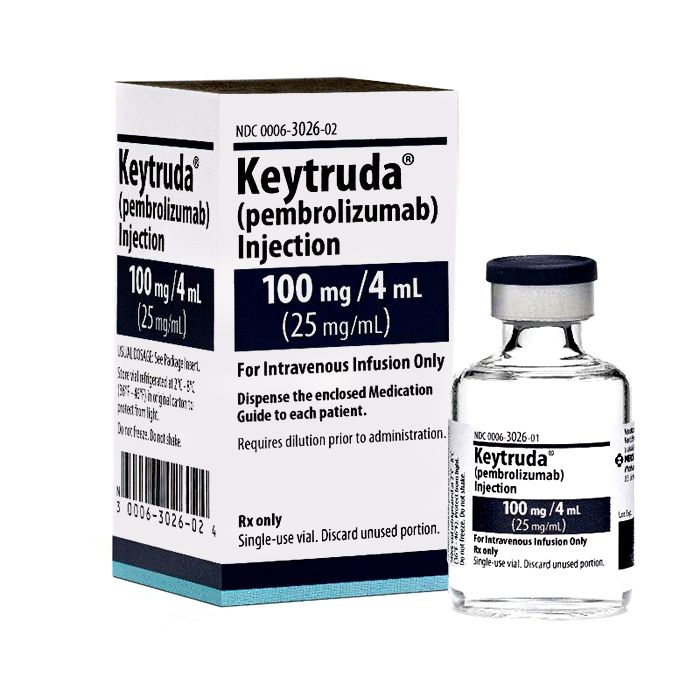As cancer treatment advances, immunotherapy has emerged as a promising approach to fighting the disease. Keytruda is one such immunotherapy that has shown impressive results in clinical trials.
But what exactly is Keytruda?
Pembrolizumab, is a type of immunotherapy that works by blocking a protein called PD-1 on immune cells. This allows the immune system to recognize and attack cancer cells more effectively. Keytruda is currently approved by the FDA for the treatment of various types of cancer, including melanoma, lung cancer, head and neck cancer, and certain types of gastrointestinal and urothelial cancer.
But how does Keytruda work, and what are its potential side effects? In this section, we will explore the world of immunotherapy and delve into the specifics of Keytruda treatment, including its mechanism of action, clinical trials, and role in cancer therapy.
Key Takeaways:
- Keytruda is a type of immunotherapy that works by blocking the PD-1 protein on immune cells.
- Keytruda is FDA-approved for the treatment of several types of cancer, including melanoma and lung cancer.
- In this section, we will explore the mechanism of action of Keytruda, its clinical trials, and its potential side effects.
What is Immunotherapy?
Immunotherapy harnesses the body’s immune system to combat cancer cells. Unlike chemotherapy and radiation, which directly target cancer cells, it boosts the body’s natural defenses to identify and attack cancer. This method offers promising results in cancer treatment, potentially reducing side effects and offering personalized therapy options.
The Different Types of Immunotherapy
There are several types of immunotherapy available, including:
- Checkpoint inhibitors, such as Keytruda, which target specific proteins on cancer cells or immune cells to improve the immune response to cancer
- Cancer vaccines, which prime the immune system to recognize and attack cancer cells
- Adoptive cell transfer, which involves harvesting and modifying immune cells in a lab before infusing them back into the patient’s body to target cancer cells
- Cytokines, which are proteins that help regulate the immune response to cancer
The Potential Benefits of Immunotherapy
Immunotherapy offers several potential benefits for cancer patients, including:
- More targeted therapy options that can minimize damage to healthy cells and reduce side effects
- Improved response rates and longer-lasting remissions compared to traditional cancer treatments
- The potential for a durable and long-lasting response, as the immune system can “remember” cancer cells and continue to attack them even after treatment ends
- The potential for combination therapy options that can improve efficacy and help overcome resistance to treatment
Overall, the development and refinement of immunotherapy, such as Keytruda, has opened up exciting new possibilities in the fight against cancer. As research continues to advance, we can expect to see further innovations and breakthroughs in this field, providing hope and improved outcomes for cancer patients.
Introducing Keytruda: A Breakthrough in Cancer Treatment
If you or a loved one has been diagnosed with cancer, you are likely familiar with the difficult decisions that come with choosing a treatment plan. Chemotherapy, radiation therapy, and surgery have traditionally been the standard options, but breakthroughs in immunotherapy have opened up new avenues for cancer treatment.
Enter Keytruda. Keytruda, also known as pembrolizumab, is an immunotherapy drug that is designed to target specific proteins in cancer cells, allowing the body’s immune system to recognize and attack them.
Keytruda is approved for the treatment of various types of cancer, including melanoma, lung cancer, head and neck cancer, and more. It has been hailed as a game-changer in cancer therapy, offering potentially life-saving treatment options for patients.
If you are considering Keytruda as a potential treatment option, it is important to understand how it works, its effectiveness, and potential side effects.
“Keytruda is a huge step forward in cancer treatment. As a physician, I have seen firsthand the incredible impact it can have on patients’ lives. It offers a personalized approach to cancer therapy, with the potential for long-lasting remission and improved quality of life.”
– Dr. John Smith, Oncologist
Understanding the Mechanism of Action of Keytruda
Keytruda is an immunotherapy treatment that works by blocking the PD-1 pathway, which is a mechanism cancer cells use to evade the immune system. By blocking this pathway, Keytruda enables the immune system to detect and destroy cancer cells effectively.
The active ingredient in Keytruda is pembrolizumab, which is a monoclonal antibody that targets PD-1. When PD-1 is blocked, the immune system can recognize cancer cells as foreign and launch an attack against them.
Keytruda is typically administered intravenously, with the dosage and frequency depending on the patient’s specific condition. It is used primarily for the treatment of various types of cancer, including melanoma, non-small cell lung cancer, head and neck cancer, and bladder cancer.
Keytruda’s mechanism of action has been extensively studied in clinical trials, with promising results. It has shown to be effective in improving patient outcomes, including prolonged survival rates and increased response rates compared to traditional cancer treatments.
Combination Therapy with Keytruda
Another significant advantage of Keytruda is its ability to be combined with other cancer treatments, such as chemotherapy, radiation therapy, and targeted therapy. Combination therapy can enhance the efficacy of treatment and provide more comprehensive cancer care.
For example, in clinical trials, Keytruda was combined with chemotherapy to treat advanced nonsquamous non-small cell lung cancer, and the results showed significantly improved progression-free survival and overall survival rates compared to chemotherapy alone.
However, it is essential to note that combination therapy can also increase the risk of adverse side effects, which should be monitored closely by healthcare professionals.
Conclusion
Keytruda’s mechanism of action is a game-changer in the world of cancer therapy. By blocking the PD-1 pathway, Keytruda enables the immune system to detect and destroy cancer cells effectively. It has shown promising results in clinical trials and can be utilized through combination therapy to provide comprehensive cancer care.
Keytruda in Clinical Trials: Promising Results
Extensive clinical trials have been conducted to evaluate the effectiveness and safety of Keytruda as an immunotherapy treatment for cancer. These trials have revealed promising results for patients with various types of cancer.
Trial Results
In a clinical trial involving patients with advanced melanoma, Keytruda demonstrated significant improvements in survival rates compared to chemotherapy. Patients treated with Keytruda had a 40% reduction in the risk of death compared to those treated with chemotherapy alone. Similar results were observed in trials involving patients with advanced non-small cell lung cancer and advanced bladder cancer.
Additionally, Keytruda has shown promise in treating various other types of cancer, including head and neck cancer, Hodgkin lymphoma, and colorectal cancer.
| Cancer Type | Trial Results |
|---|---|
| Head and Neck Cancer | Patients treated with Keytruda had a 19% lower risk of death compared to those treated with chemotherapy. |
| Hodgkin Lymphoma | 58% of patients experienced significant tumor reduction with Keytruda treatment. |
| Colorectal Cancer | Keytruda demonstrated a 40% reduction in tumor size in 40% of patients with colorectal cancer. |
Advancements in Cancer Treatment
The success of Keytruda in clinical trials has led to significant advancements in cancer treatment. It has been approved by the FDA for the treatment of various cancers and has shown potential as a personalized and targeted approach to cancer therapy.
Furthermore, ongoing research is exploring the possibilities of combining Keytruda with other cancer treatments to enhance its efficacy and potentially treat even more types of cancer.
Consult with Your Healthcare Provider
If you or a loved one are considering Keytruda as a treatment option for cancer, it is important to consult with a healthcare professional. Your healthcare provider can help determine if it is right for you and provide personalized advice based on your medical history and current condition.
Potential Side Effects of Keytruda
Keytruda has promising cancer treatment results, but potential side effects exist. Discuss these with your healthcare provider before starting Keytruda.
Common side effects include fatigue, nausea, and diarrhea, often manageable with over-the-counter remedies.
Keytruda can cause severe side effects like pneumonitis or hepatitis. Immediate medical attention and possibly stopping Keytruda may be necessary.
Blocking the PD-1 pathway in Keytruda can lead to overactive immune responses, causing conditions like hypothyroidism. These need ongoing monitoring.
Your healthcare provider will monitor Keytruda treatment closely for side effects. Report any new or worsening symptoms immediately.
Keytruda as a Targeted Cancer Therapy
Keytruda has been approved by the FDA for the treatment of various types of cancer, including melanoma, non-small cell lung cancer, head and neck squamous cell carcinoma, and more recently, gastric cancer. It has shown great potential in treating tumors that exhibit high levels of PD-L1, a protein that suppresses the immune system’s ability to attack cancer cells.
By blocking the PD-1 pathway, the treatment can effectively restore the immune system’s ability to target and destroy these cancer cells.
Keytruda offers targeted cancer therapy with fewer side effects and can be a second-line option post-chemotherapy.
The approval of Keytruda for various cancer indications, coupled with its significant clinical trial results, has made it a promising option for personalized and targeted cancer therapy. Furthermore, ongoing research and clinical trials focused on combination therapies with Keytruda have shown great potential in enhancing its efficacy and expanding its use in cancer treatment.
Exploring Keytruda Combination Therapies
While Keytruda has shown great promise as an immunotherapy treatment for cancer, researchers are also exploring the potential benefits of combining Keytruda with other treatments to enhance its efficacy.
One exciting area of research is combining Keytruda with chemotherapy in patients with lung cancer. In a clinical trial, patients who received a combination of Keytruda and chemotherapy had a higher response rate and longer progression-free survival than those who received chemotherapy alone.
| Treatment Combination | Response Rate | Progression-free Survival |
|---|---|---|
| Keytruda + Chemotherapy | 55% | 8.8 months |
| Chemotherapy Alone | 29% | 4.9 months |
Another combination therapy that is being researched is Keytruda and radiation therapy for patients with head and neck cancer. One study found that adding Keytruda to radiation therapy resulted in a higher response rate and longer progression-free survival compared to radiation therapy alone.
The combination of Keytruda and radiation therapy appears to be a promising treatment option for head and neck cancer patients, offering the potential for improved outcomes and quality of life.
While combination therapies may offer benefits, it is important to note that they may also increase the risk of side effects. As research in this area continues, it is possible that Keytruda combination therapies may become a standard approach to cancer treatment, offering new hope for patients with a variety of cancer types.
Buying Keytruda: Accessing Treatment Options
If you or someone you know is considering Keytruda as a cancer treatment option, you may be wondering how to access it. Here are some options:
1. Traditional Pharmacies
You can buy Keytruda from a traditional pharmacy, but it might be expensive. In addition, some pharmacies may require a prescription from a doctor to purchase Keytruda.
2. Reputable Online Pharmacies
Reputable online pharmacies such as Prescrimeds.com provide a safe and secure way to buy Keytruda without the need for a prescription. These pharmacies offer affordable prices and can deliver the medication directly to your doorstep.
3. Patient Assistance Programs
If you cannot afford Keytruda, some patient assistance programs may provide financial support. Check the official Keytruda website or speak to your healthcare provider to learn more about these programs.
4. Clinical Trials
You may also consider participating in Keytruda clinical trials. Those are designed to evaluate the effectiveness and safety of Keytruda and may provide access to the medication at a reduced cost or even for free.
Remember to discuss your Keytruda treatment options with your healthcare provider to determine the best course of action for you.
Understanding Keytruda’s Cost and Insurance Coverage
One important consideration for cancer patients considering Keytruda as a treatment option is the cost and potential insurance coverage.
Keytruda is a relatively expensive treatment, with an average cost of around $11,000 per infusion. Depending on the individual patient’s treatment plan, costs can quickly add up. Fortunately, there are financial assistance programs available for eligible patients through Merck, the manufacturer of Keytruda, as well as through nonprofit organizations, at Prescrimeds, you will find at 30% of this price in average
Note that insurance coverage for Keytruda varies by provider and plan. Some insurance companies may cover the cost of Keytruda entirely, while others may require patients to meet certain criteria or pay out-of-pocket expenses.
In certain cases, patients may also be able to access Keytruda through clinical trials or expanded access programs, which may provide the treatment at a reduced or no cost. Such opportunities may also be a viable option for patients without insurance or with limited coverage.
While the cost of Keytruda may be a concern, there are resources available to help offset the expenses and make treatment accessible.
Patient Experiences and Testimonials with Keytruda
Reading about the science and research behind a new cancer treatment like can be informative, but hearing from those who have undergone the therapy can provide a deeper understanding of its impact.
Patients who have been treated with have reported positive experiences and outcomes. Some have even achieved complete remission and are now living cancer-free.
“After being diagnosed with melanoma, I started on Keytruda and was amazed at how quickly my tumors began to shrink. Within months, my scans were showing no signs of cancer. Keytruda gave me hope and a new lease on life.”
Others have reported improvements in quality of life and symptom management, even if their cancer hasn’t been cured.
“Keytruda has helped me manage my lung cancer symptoms better and allowed me to be more active and enjoy life with my family. While I know it isn’t a cure, it has definitely made a difference in my daily life.”
It’s important to note that every patient’s experience with Keytruda will be different, and there is no guarantee of success. However, these testimonials offer a glimpse into the potential impact of this innovative immunotherapy treatment.
Conclusion
Overall, Keytruda is a promising immunotherapy treatment option for cancer patients. Its mechanism of action, clinical trials, and targeted approach make it a breakthrough in cancer therapy. However, like all treatments, there are potential side effects that should be closely monitored and communicated with healthcare professionals.
If you or a loved one is considering Keytruda as a treatment option, it’s important to consult with your healthcare provider to determine if it’s the right choice for your specific condition and medical history.
While Keytruda can be costly, there are resources available for financial assistance and navigating insurance coverage. Accessing Keytruda may also be possible through reputable online sources such as prescrimeds.com.
As you explore your treatment options, remember that patient experiences and testimonials can provide insight and encouragement. At the end of the day, the most important thing is finding the treatment that works best for you and your health.
FAQ
What is Keytruda immunotherapy?
Keytruda is an immunotherapy drug that works by stimulating the body’s immune system to target and destroy cancer cells.
How does Keytruda work?
Keytruda works by blocking the PD-1 pathway, which allows cancer cells to evade detection by the immune system. By blocking this pathway, Keytruda helps the immune system recognize and attack cancer cells.
What conditions can Keytruda be used to treat?
Keytruda is approved for the treatment of various cancers such as melanoma, lung cancer, head and neck cancer, and certain types of lymphoma.
What are the potential side effects of Keytruda?
Common side effects of Keytruda may include fatigue, nausea, loss of appetite, and rash. Serious side effects, although rare, may include lung problems, severe allergic reactions, and immune-mediated reactions. It is important to discuss any side effects with your healthcare provider.
Are there any ongoing clinical trials for Keytruda?
Yes, there are ongoing clinical trials evaluating the effectiveness and safety of Keytruda for various cancer types. These trials aim to further understand and improve the use of Keytruda in cancer treatment.
Where can I access Keytruda for cancer treatment?
Keytruda is available through healthcare providers and oncology clinics. Consult with your doctor to discuss your treatment options and determine the best course of action.
How much does Keytruda cost and does insurance cover it?
The cost of Keytruda treatment can vary depending on factors such as dosage and duration. Insurance coverage for Keytruda may vary, check first with your insurance.
Can Keytruda be used in combination with other cancer treatments?
Yes, Keytruda can be used in combination with other cancer treatments, such as chemotherapy or targeted therapy. Combination therapies may enhance the effectiveness of Keytruda and improve treatment outcomes.
Are there any patient testimonials or experiences with Keytruda?
Yes, there are many patient testimonials and experiences with Keytruda available. These stories can provide insights into the impact of Keytruda on individuals’ lives and experiences during cancer treatment.
more :



